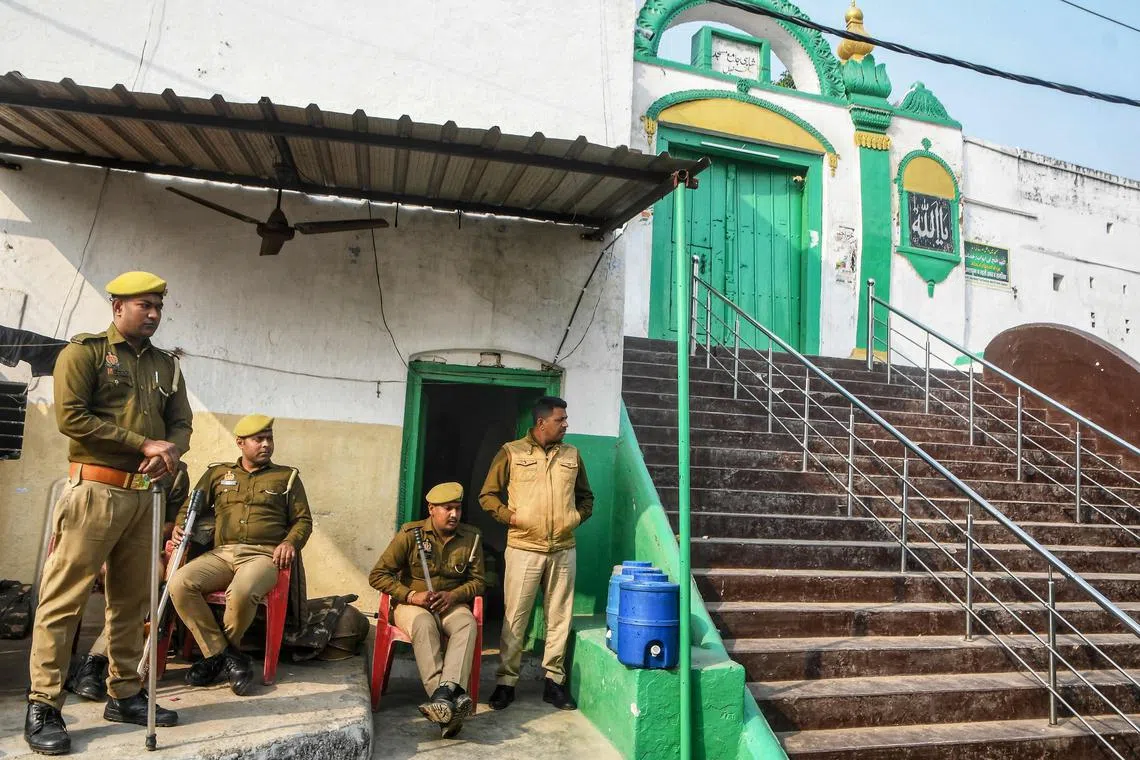Tensions rise as Indian court mandates survey of Muslim shrine over temple claims
Sign up now: Get ST's newsletters delivered to your inbox

Pilgrims visiting the site of the tomb of Sufi saint Khwaja Moinuddin Chishti in Ajmer, Rajasthan, on Nov 28.
PHOTO: AFP
Follow topic:
NEW DELHI – A Muslim shrine sitting at the heart of the Indian sub-continent’s syncretic tradition is the latest place of worship caught in a deepening effort by Hindu nationalists to restore temples once built on Muslim sites, further straining inter-religious ties.
A civil court in Ajmer city, in the state of Rajasthan, issued notices on Nov 27 to the Indian government and the Archaeological Survey of India (ASI), among others, in a suit claiming that Ajmer Sharif Dargah was built on the site of a Hindu temple.
The suit, filed by Mr Vishnu Gupta, president of the Hindu Sena nationalist group, claimed that a temple to Lord Shiva previously existed on the site of the tomb of Sufi saint Khwaja Moinuddin Chishti, who died in AD1236.
The nationalist group has not only sought a survey of the site by the ASI, but also the right for Hindus to pray at the shrine built by Mughal King Humayun, even though it is already revered across faiths in the sub-continent.
The dispute has sparked wide-ranging reactions, with the shrine’s caretakers blaming the Hindu nationalists for seeking to disturb the peace.
“There is no doubt that right-wing forces are aiming to isolate Muslims and disrupt communal harmony by eyeing the Sufi shrine,” Mr Syed Sarwar Chishti, secretary of the Anjuman Syed Zadgan body that represents the shrine’s caretakers, told reporters on Nov 28.
Places of worship in India have constitutional protection under the Places of Worship (Special Provisions) Act, which mandates their preservation and prohibits their conversion to places of worship for any other faith.
In the last four years, however, the courts have allowed surveys under the guise of clarifying the religious character of disputed sites, prompting a flurry of petitions. Hindu nationalist groups see it as an opportunity to pursue their demands.
This is a trend that activists say has dangerous repercussions in a multi-religious society where communal polarisation has been rising.
The Ajmer petition came days after five people died in violent clashes protesting against another survey that the courts had ordered of the 16th-century Shahi Jama Masjid mosque in Sambhal, in the state of Uttar Pradesh, which Hindu groups claim was built on the site of a destroyed temple.
Demonstrations against the survey team turned violent on Nov 24, with protesters reportedly killed in firing amid heavy police presence. The Supreme Court has now put the survey on hold.

State police personnel deployed outside the Shahi Jama Masjid following religious violence in Sambhal on Nov 25.
PHOTO: AFP
Still, more than a dozen petitions, including the ones in Sambhal and Ajmer, are pending in courts across the country.
Other petitions involve Hindu groups and individuals claiming rights to the Shahi Idgah mosque in Mathura city and Gyanvapi mosque in the holy city of Varanasi. Both are in Uttar Pradesh.
For a long time, Hindu groups have argued that historical wrongs need to be corrected as temples were destroyed to build mosques and other structures under the Mughals, a Muslim dynasty that ruled most of northern India from the early 16th to mid-18th century.
“History is witness to the fact that Mughals destroyed temples, statues and took over structures. They didn’t build these structures,” Mr Madan Rathore, president of the ruling Bharatiya Janata Party’s (BJP) Rajasthan unit, told The Straits Times.
He added that the party would go by the court order in Ajmer and elsewhere.
Even though the BJP is supported by Hindu nationalist groups and has a strong Hindu agenda, it is divided on the trend of seeking temple surveys.
The Ajmer Sharif, in particular, has had some BJP politicians speaking out against the trend.
“For a while now, the Ajmer shrine has been a source of contention for some extremist groups. It has been subjected to ridiculous claims by some who clearly don’t understand the history and significance of Sufi thought,” wrote BJP spokeswoman Shazia Ilmi in The Indian Express newspaper.
“An India that is marching on the steady path of inclusive development can do without communal upheavals and disruptions.”
The Ajmer Sharif, visited daily by 20,000 people of all faiths from India and the rest of South Asia, symbolises Sufism, the mystical branch of Islam.
Believers offer a chador, or a piece of cloth believed to carry their prayers and wishes, to the Sufi saint Khwaja Moinuddin Chishti, known for his teaching of religious harmony and peaceful coexistence.
Indian Prime Minister Narendra Modi, continuing a tradition set by other leaders, sent a chador on the death anniversary of the saint at the beginning of the year.
At least one prominent Muslim religious leader has asked for Mr Modi to intervene and reach out to Muslims over these developments.
“Win the hearts of Muslims. Stop the miscreants who are trying to create tensions and affect the atmosphere of the country,” the Shahi Imam of Delhi’s Jama Masjid, Mr Syed Ahmed Bukhari, was quoted as saying by the Indian media.
His own mosque is the subject of a survey request to the ASI by the Hindu Sena, which claims Hindu idols are buried beneath the mosque.
India has a history of mosque-temple disputes, most notably over the 1992 demolition of the Babri Masjid mosque in the city of Ayodhya by a Hindu mob. The incident triggered communal violence that killed around 2,000 people across the country.
In 2019, the Supreme Court awarded the disputed land in the state of Uttar Pradesh to the Hindus while affirming the validity of the Places of Worship Act. The Muslims were given an alternate site.
But, in 2022, former chief justice D.Y. Chandrachud noted that although the Act prohibits the conversion of a religious site for other faiths, determining the religious character of a place, as a procedural tool, might not necessarily violate the law. He made the observation in the Gyanvapi mosque case, which activists say opened the door to more litigation over disputed sites.
Activists are now exploring legal options to stop the revisionist trend in the Supreme Court, where petitions challenging the validity of the Places of Worship Act are also pending. The petitions against the Act have been handed over to a three-judge Bench of the Supreme Court, which will start hearing them from Dec 12.
Among the activists is the People’s Union for Civil Liberties (PUCL), a human rights body, which plans to approach the Supreme Court to seek an end to survey claims.
“We cannot just go back and back. What is the point of such clarifications? Where does it go from there?” said PUCL’s national president Kavita Srivastava.
“We have to implement the Places of Worship Act to the hilt.”


